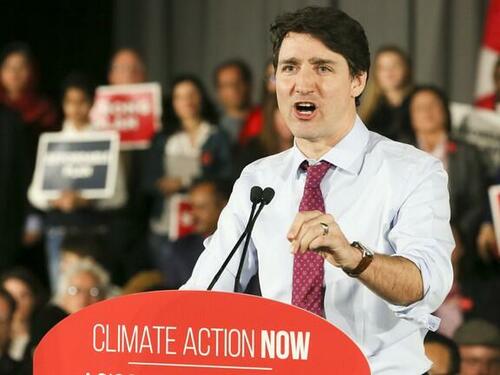
With stagflation becoming a rising concern not just for Americans but also Canadians, the pious pontificating from climate alarmists on the virtues of carbon controls is taking a back seat to more legitimate economic fears. No one cares about carbon “pollution” when they can barely feed and house their families.
Across the board, calls for cheaper energy alternatives are growing. Every western nation is pushing for more coal power and more nuclear power as oil prices inflate. At the same time, food and other necessities are witnessing a price explosion unlike anything we have seen in the past 40 years.
Not surprisingly, though, many environmentalists and political elites are heralding inflation as a perfect opportunity to enforce a new Green Agenda much like the Green New Deal. With prices climbing higher, carbon taxes on various industries and families can be introduced and the public won't know what percentage of inflation is being caused by currency devaluation, supply chain problems or by artificially instituted carbon costs.
If prices are already high, then maybe the population will get used to the lower standard of living that will inevitably be associated with carbon controls?
Canadian Prime Minister Justin Trudeau is implementing a not-so-novel solution to potential public resistance by introducing carbon tax credits or carbon checks, which certain families will receive four times a year. Lower income families with two children will receive up to $745 a year depending on the province in which they live. The measure appears to be very similar to “inflation checks” offered by California's governor Gavin Newsom in the wake of crushing price increases.
Of course, these tax incentives are paltry when compared to the overall cost of carbon controls and the affects they will have on people's pocket books. $745 in a year is nowhere near enough to make up for higher food costs, let alone the rising prices in other necessities.
Will Canadians be conned by scraps from the government's vast tax table? Hopefully not. The Canadian government says the incentive payments mean 80% of families will be better off financially compared to what they pay in carbon taxes. However, the parliamentary budget officer says when the total impact of Trudeau’s carbon tax on the economy is considered, 60% of families are left worse off. This is probably still generous.
Keep in mind that carbon taxes are being pursued in the name of stopping global warming, which even the NOAA admits has only resulted in a 1 degree Celsius increase in global temperatures in the past century. This May, the NOAA indicated that global temps were only 0.77C above average. The average is derived from an incredibly short temperature record which officially starts in the 1880s. Yet, the public is supposed to entertain visions of environmental catastrophe and clamor for taxation on the air we breath?
With stagflation becoming a rising concern not just for Americans but also Canadians, the pious pontificating from climate alarmists on the virtues of carbon controls is taking a back seat to more legitimate economic fears. No one cares about carbon “pollution” when they can barely feed and house their families.
Across the board, calls for cheaper energy alternatives are growing. Every western nation is pushing for more coal power and more nuclear power as oil prices inflate. At the same time, food and other necessities are witnessing a price explosion unlike anything we have seen in the past 40 years.
Not surprisingly, though, many environmentalists and political elites are heralding inflation as a perfect opportunity to enforce a new Green Agenda much like the Green New Deal. With prices climbing higher, carbon taxes on various industries and families can be introduced and the public won’t know what percentage of inflation is being caused by currency devaluation, supply chain problems or by artificially instituted carbon costs.
If prices are already high, then maybe the population will get used to the lower standard of living that will inevitably be associated with carbon controls?
Canadian Prime Minister Justin Trudeau is implementing a not-so-novel solution to potential public resistance by introducing carbon tax credits or carbon checks, which certain families will receive four times a year. Lower income families with two children will receive up to $745 a year depending on the province in which they live. The measure appears to be very similar to “inflation checks” offered by California’s governor Gavin Newsom in the wake of crushing price increases.
Of course, these tax incentives are paltry when compared to the overall cost of carbon controls and the affects they will have on people’s pocket books. $745 in a year is nowhere near enough to make up for higher food costs, let alone the rising prices in other necessities.
Will Canadians be conned by scraps from the government’s vast tax table? Hopefully not. The Canadian government says the incentive payments mean 80% of families will be better off financially compared to what they pay in carbon taxes. However, the parliamentary budget officer says when the total impact of Trudeau’s carbon tax on the economy is considered, 60% of families are left worse off. This is probably still generous.
Keep in mind that carbon taxes are being pursued in the name of stopping global warming, which even the NOAA admits has only resulted in a 1 degree Celsius increase in global temperatures in the past century. This May, the NOAA indicated that global temps were only 0.77C above average. The average is derived from an incredibly short temperature record which officially starts in the 1880s. Yet, the public is supposed to entertain visions of environmental catastrophe and clamor for taxation on the air we breath?






